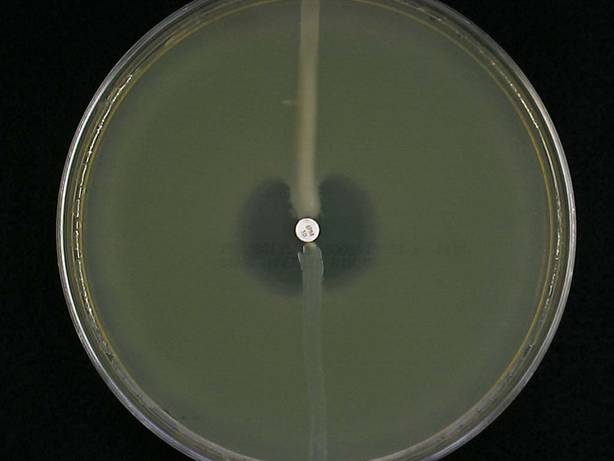Modified Hodge test
Infections with extended spectrum beta lactamase (ESBL) producing enterobacteriaceae are a serious serious concern in Pakistan. Carbapenems are treatment of choice for these infections. Unfortunately resistance to carbapenems in enterobacteriaceae is also emerging. This resistance is difficult to detect by routine disc diffusion method used by many laboratories in Pakistan. Most of the time this is due to carpapenemase production and detection of this enzyme could be confirmed by Modified Hodge test as recommended by CLSI 2009. This test is a phenotypic confirmatory test for enterobacteriaceae showing elevated MICs for carbapenems
Method:
1-Indicator strain ( E-coli ATCC 25922 ) is streaked in a lawn on agar plate (Mueller hinton agar).
2-A meropenem disk is placed in the middle of the agar plate after background lawning.
3-4 colonies of the test isolate are taken with a sterile loop and streaked on the plate from meropenem disk to periphery.
4-Positive control (Klebsiella pneumoniae ATCC 1705) and negative control (Klebsiella pneumoniaeATCC 1706) are streaked on the same plate at 45 degree angulations from meropenem disk to periphery for quality control.
5-Carbapenemase producting isolate is detected by the MHT when the test isolate produces the enzyme and allows growth of a carbapenem susceptible strain (indicator strain E.coli ATCC 25922) towards a carbapenem disk. The result is a characteristic cloverleaf-like indentation incase of carbapenemase production.
6-The plates are examined after 16–24 hours of incubation for a clover- leaf type indentation at the intersection of the test organism and the E. coli 25922, within the zone of inhibition of the carbapenem susceptibility disk.
Interpretations of the diameters of zone of inhibition are as follows:
1-MHT Positive test has a clover leaf-like indentation of the E.coli 25922 growing along the test organism growth streak within the disk diffusion zone indicates that this isolate is producing a carbapenemase.
2-MHT Negative test has no growth of the E.coli 25922 along the test organism growth streak within the disc diffusion indicates that this isolate is not producing a carbapenemase.
3-QC testing: Positve control : Klebsiella pneumoniaeATCC BAA 1705
4-Negative control: Klebsiella pneumoniaeATCC BAA 1706
Modified Hodge test positive with clover leaf like indentation

Negative control = MHT negative
Contributed by
Dr.Binish Arif
Assistant professor Pathology
Jinnah Sindh Medical University
June 2018